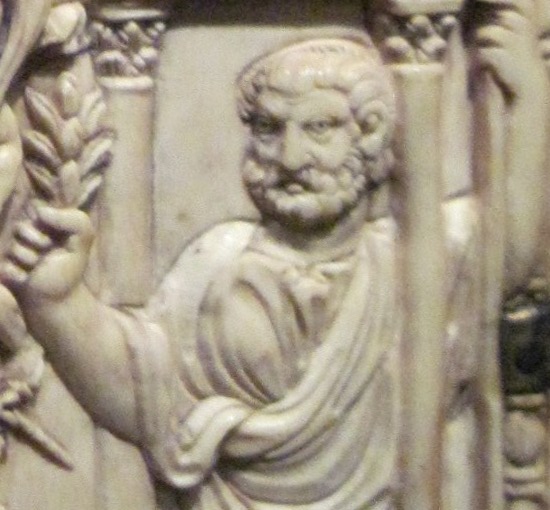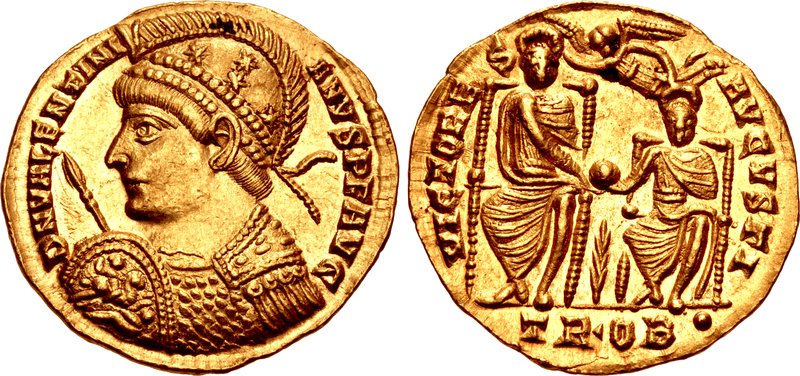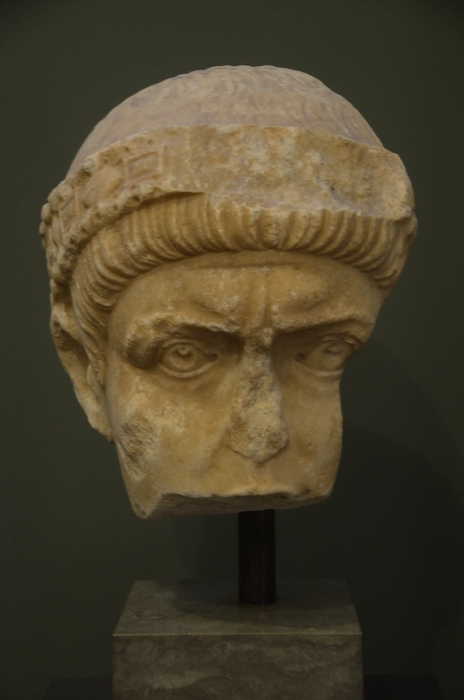|
Decimus Magnus Ausonius
Decimius Magnus Ausonius (; – c. 395) was a Roman poet and teacher of rhetoric from Burdigala in Aquitaine, modern Bordeaux, France. For a time he was tutor to the future emperor Gratian, who afterwards bestowed the consulship on him. His best-known poems are ''Mosella'', a description of the river Moselle, and ''Ephemeris'', an account of a typical day in his life. His many other verses show his concern for his family, friends, teachers, and circle of well-to-do acquaintances and his delight in the technical handling of meter. Biography Decimius Magnus Ausonius was born in Burdigala, the son of Julius Ausonius (c. AD 290–378), a physician of Greek ancestry,The Cambridge History of Classical Literature, Edward John Kenney, Cambridge University Press, p.16 and Aemilia Aeonia, daughter of Caecilius Argicius Arborius, descended on both sides from established, land-owning Gallo-Roman families of southwestern Gaul. Ausonius was given a strict upbringing by his aunt and g ... [...More Info...] [...Related Items...] OR: [Wikipedia] [Google] [Baidu] |
Bordeaux
Bordeaux ( , ; Gascon oc, Bordèu ; eu, Bordele; it, Bordò; es, Burdeos) is a port city on the river Garonne in the Gironde department, Southwestern France. It is the capital of the Nouvelle-Aquitaine region, as well as the prefecture of the Gironde department. Its inhabitants are called ''"Bordelais"'' (masculine) or ''"Bordelaises"'' (feminine). The term "Bordelais" may also refer to the city and its surrounding region. The city of Bordeaux proper had a population of 260,958 in 2019 within its small municipal territory of , With its 27 suburban municipalities it forms the Bordeaux Metropolis, in charge of metropolitan issues. With a population of 814,049 at the Jan. 2019 census. it is the fifth most populated in France, after Paris, Lyon, Marseille and Lille and ahead of Toulouse. Together with its suburbs and exurbs, except satellite cities of Arcachon and Libourne, the Bordeaux metropolitan area had a population of 1,363,711 that same year (Jan. 2019 census), ma ... [...More Info...] [...Related Items...] OR: [Wikipedia] [Google] [Baidu] |
Gaul
Gaul ( la, Gallia) was a region of Western Europe first described by the Romans. It was inhabited by Celtic and Aquitani tribes, encompassing present-day France, Belgium, Luxembourg, most of Switzerland, parts of Northern Italy (only during Republican era, Cisalpina was annexed in 42 BC to Roman Italy), and Germany west of the Rhine. It covered an area of . According to Julius Caesar, Gaul was divided into three parts: Gallia Celtica, Belgica, and Aquitania. Archaeologically, the Gauls were bearers of the La Tène culture, which extended across all of Gaul, as well as east to Raetia, Noricum, Pannonia, and southwestern Germania during the 5th to 1st centuries BC. During the 2nd and 1st centuries BC, Gaul fell under Roman rule: Gallia Cisalpina was conquered in 204 BC and Gallia Narbonensis in 123 BC. Gaul was invaded after 120 BC by the Cimbri and the Teutons, who were in turn defeated by the Romans by 103 BC. Julius Caesar finally subdued the remaining parts of ... [...More Info...] [...Related Items...] OR: [Wikipedia] [Google] [Baidu] |
Consulate
A consulate is the office of a consul. A type of diplomatic mission, it is usually subordinate to the state's main representation in the capital of that foreign country (host state), usually an embassy (or, only between two Commonwealth countries, a high commission). The term "consulate" may refer not only to the office of a consul, but also to the building occupied by the consul and the consul's staff. The consulate may share premises with the embassy itself. Consular rank A consul of the highest rank is termed a consul-general and is appointed to a consulate-general. There are typically one or more deputy consuls-general, consuls, vice-consuls, and consular agents working under the consul-general. A country may appoint more than one consul-general to another nation. Authority and activities Consuls of various ranks may have specific legal authority for certain activities, such as notarizing documents. As such, diplomatic personnel with other responsibilities may receive c ... [...More Info...] [...Related Items...] OR: [Wikipedia] [Google] [Baidu] |
Proconsul
A proconsul was an official of ancient Rome who acted on behalf of a consul. A proconsul was typically a former consul. The term is also used in recent history for officials with delegated authority. In the Roman Republic, military command, or ''imperium'', could be exercised constitutionally only by a consul. There were two consuls at a time, each elected to a one-year term. They could not normally serve two terms in a row. If a military campaign was in progress at the end of a consul's term, the consul in command might have his command prorogued, allowing him to continue in command. This custom allowed for continuity of command despite the high turnover of consuls. In the Roman Empire, proconsul was a title held by a civil governor and did not imply military command. In modern times, various officials with notable delegated authority have been referred to as proconsuls. Studies of leadership typically divide leaders into policymakers and subordinate administrators. The proconsu ... [...More Info...] [...Related Items...] OR: [Wikipedia] [Google] [Baidu] |
Bissula
Bissula (flourished in 4th century AD) was an Alemannic woman in the 4th century. She was captured by the Romans in 368 at a young age, and became a slave of the Roman poet Ausonius Decimius Magnus Ausonius (; – c. 395) was a Roman poet and teacher of rhetoric from Burdigala in Aquitaine, modern Bordeaux, France. For a time he was tutor to the future emperor Gratian, who afterwards bestowed the consulship on him. H .... Ausonius fell deeply in love with Bissula, and released her from slavery. He wrote a poem on her, ''de Bissula'' ("About Bissula"), which he sent to his friend Paulus. Sources Latin textof beginning of the main part. Click on Next for the next part. a German translation by M. W. Besser, 1908 * Friedrich Marx: Ausonius 3. In: Paulys Realencyclopädie der classischen Altertumswissenschaft (RE). Band II,2, Stuttgart 1896, Sp. 2562–2580, hier Sp. 2564 und Sp. 2571. * Felix Dahn: Gesammelte Werke. Erste Serie, Band 3. Berlin 1884. 4th-century Germanic ... [...More Info...] [...Related Items...] OR: [Wikipedia] [Google] [Baidu] |
Alemanni
The Alemanni or Alamanni, were a confederation of Germanic tribes * * * on the Upper Rhine River. First mentioned by Cassius Dio in the context of the campaign of Caracalla of 213, the Alemanni captured the in 260, and later expanded into present-day Alsace, and northern Switzerland, leading to the establishment of the Old High German language in those regions, by the eighth century named '' Alamannia''. In 496, the Alemanni were conquered by Frankish leader Clovis and incorporated into his dominions. Mentioned as still pagan allies of the Christian Franks, the Alemanni were gradually Christianized during the seventh century. The is a record of their customary law during this period. Until the eighth century, Frankish suzerainty over Alemannia was mostly nominal. After an uprising by Theudebald, Duke of Alamannia, though, Carloman executed the Alamannic nobility and installed Frankish dukes. During the later and weaker years of the Carolingian Empire, the Alemannic co ... [...More Info...] [...Related Items...] OR: [Wikipedia] [Google] [Baidu] |
Quintus Aurelius Symmachus
Quintus Aurelius Symmachus signo Eusebius (, ; c. 345 – 402) was a Roman statesman, orator, and man of letters. He held the offices of governor of proconsular Africa in 373, urban prefect of Rome in 384 and 385, and consul in 391. Symmachus sought to preserve the traditional religions of Rome at a time when the aristocracy was converting to Christianity, and led an unsuccessful delegation of protest against Emperor Gratian's order to remove the Altar of Victory from the curia, the principal meeting place of the Roman Senate in the Forum Romanum. Two years later he made a famous appeal to Gratian's successor, Valentinian II, in a dispatch that was rebutted by Ambrose, the bishop of Milan. Symmachus's career was temporarily derailed when he supported the short-lived usurper Magnus Maximus, but he was rehabilitated and three years later appointed consul. After the death of Theodosius I, he became an ally of Stilicho, the guardian of emperor Honorius. In collaboration with Sti ... [...More Info...] [...Related Items...] OR: [Wikipedia] [Google] [Baidu] |
Quaestor
A ( , , ; "investigator") was a public official in Ancient Rome. There were various types of quaestors, with the title used to describe greatly different offices at different times. In the Roman Republic, quaestors were elected officials who supervised the state treasury and conducted audits. When assigned to provincial governors, the duties were mainly administrative and logistical, but also could expand to encompass military leadership and command. It was the lowest ranking position in the ' (course of offices); by the first century BC, one had to have been quaestor to be eligible for any other posts. In the Roman Empire, the position initially remained as assistants to the magistrates with financial duties in the provinces, but over time, it faded away in the face of the expanding imperial bureaucracy. A position with a similar name (the ') emerged during the Constantinian period with judicial responsibilities. Etymology ''Quaestor'' derives from the Latin verb ', ' ... [...More Info...] [...Related Items...] OR: [Wikipedia] [Google] [Baidu] |
Gratianus
Gratian (; la, Gratianus; 18 April 359 – 25 August 383) was emperor of the Western Roman Empire from 367 to 383. The eldest son of Valentinian I, Gratian accompanied his father on several campaigns along the Rhine and Danube frontiers and was raised to the rank of ''Augustus'' in 367. Upon the death of Valentinian in 375, Gratian took over government of the west while his half-brother Valentinian II was also acclaimed emperor in Pannonia. Gratian governed the western provinces of the empire, while his uncle Valens was already the emperor over the east. Gratian subsequently led a campaign across the Rhine, attacked the Lentienses, and forced the tribe to surrender. That same year, the eastern emperor Valens was killed fighting the Goths at the Battle of Adrianople, which led to Gratian elevating Theodosius to replace him in 379. Gratian favoured Nicene Christianity over traditional Roman religion, issuing the Edict of Thessalonica, refusing the office of '' pontifex maximus' ... [...More Info...] [...Related Items...] OR: [Wikipedia] [Google] [Baidu] |
Valentinian I
Valentinian I ( la, Valentinianus; 32117 November 375), sometimes called Valentinian the Great, was Roman emperor from 364 to 375. Upon becoming emperor, he made his brother Valens his co-emperor, giving him rule of the eastern provinces. Valentinian retained the west. During his reign, Valentinian fought successfully against the Alamanni, Quadi, and Sarmatians. Most notable was his victory over the Alamanni in 367 at the Battle of Solicinium. His general Count Theodosius defeated a revolt in Africa and the Great Conspiracy, a coordinated assault on Roman Britain by Picts, Scots, and Saxons. Valentinian was also the last emperor to conduct campaigns across both the Rhine and Danube rivers. Valentinian rebuilt and improved the fortifications along the frontiers, even building fortresses in enemy territory. He founded the Valentinianic dynasty, with his sons Gratian and Valentinian II succeeding him in the western half of the empire. Early life Valentinian was born in 321 ... [...More Info...] [...Related Items...] OR: [Wikipedia] [Google] [Baidu] |
Bishop Of Nola
The Diocese of Nola ( la, Dioecesis Nolana) is a Roman Catholic diocese in Italy, suffragan of the Archdiocese of Naples."Diocese of Nola" ''''. David M. Cheney. Retrieved February 29, 2016."Diocese of Nola" ''GCatholic.org''. Gabriel Chow. Retrieved February 29, 2016. Its seat is the n city of |





.jpg)

